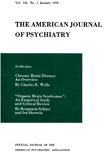BEHAVIORAL CHANGES IN PATIENTS WITH STROKES
Abstract
The individual who has had a stroke is reacting to a situation of stress that has many unique features. Patients who have experienced mild strokes with little or no residual mental impairment react to the stress in their own idiosyncratic fashion. Some will intergrate the experience successfully; others will become enmeshed in psychopathological manoeuvers of varying severity. In patients with moderate or severe brain damage, the situation is quite different. Here the unique features of the stroke are highlighted, the chief of these being that the very organ governing the adaptation to stress is itself impaired. The resulting clinical picture has to be evaluated now, not only in terms of what the experience means to the patient, but also in terms of the capacity the patient has for evaluating the situation.
Access content
To read the fulltext, please use one of the options below to sign in or purchase access.- Personal login
- Institutional Login
- Sign in via OpenAthens
- Register for access
-
Please login/register if you wish to pair your device and check access availability.
Not a subscriber?
PsychiatryOnline subscription options offer access to the DSM-5 library, books, journals, CME, and patient resources. This all-in-one virtual library provides psychiatrists and mental health professionals with key resources for diagnosis, treatment, research, and professional development.
Need more help? PsychiatryOnline Customer Service may be reached by emailing [email protected] or by calling 800-368-5777 (in the U.S.) or 703-907-7322 (outside the U.S.).



